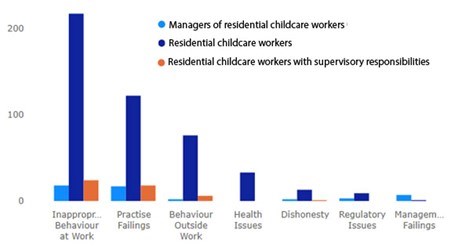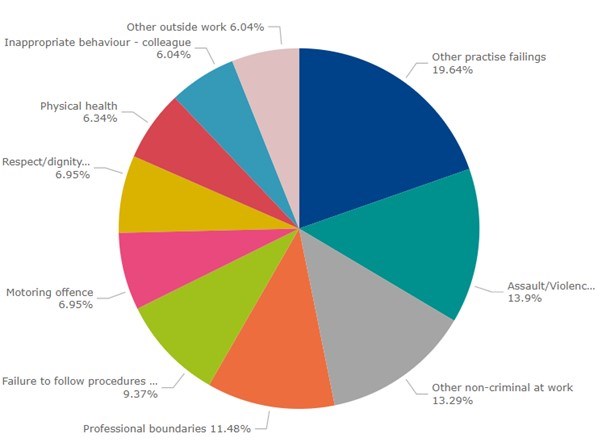There are 8,163 people currently registered and working in residential childcare in Scotland. This is 3.6% of the registered social service workforce. You can see the breakdown of the number of people on parts of our Register on our workforce data website.
Over the last two years (2021-2022) 6.9% of referrals we received were about residential childcare workers which is 7.3% of our open fitness to practise cases. This is higher than expected based on the number of registrants.
Of the 166,745 people on our Register only 1.13% of registrants currently have a case being considered by our Fitness to Practise Department.
What we consider in an investigation
When we investigate cases, we try to understand the whole circumstances and context. For example:
- training and support
- experience of the worker
- what was required under a care plan.
Why are there more residential childcare cases?
We’ve seen this trend for a few years and are doing more work to understand this. One area we’re looking at is types of behaviour.
These graphs show the types of allegations we’ve seen in the cases about residential childcare workers that have closed in the last two years.
Misconduct cases closed by type and Register part
Top 10 types of impairment
- A large proportion of cases were about inappropriate behaviour at work When we look at those cases in particular we see a large number involve:
- assault in violence at work
- professional boundaries.
This reflects particular challenges in these services where those using them can present with very challenging behaviour and/or have complex needs. Managing and meeting these needs must be balanced with maintaining good supportive relationships.
Here are some examples of types of behaviour where we have imposed sanctions on a worker’s registration.
|
Scenario |
Type of behaviour |
Sanction |
|
A worker gave a person in their care their personal mobile phone number or access to their mobile phone. |
Access to mobile phone. Boundaries. |
18-month warning and conditions imposed |
|
A worker assaulted a person in their care in response to them displaying physically challenging behaviour towards them. |
Assault - reaction |
Removal |
|
A worker slapped a person in their care after the service user touched the worker inappropriately. |
Response to touching |
12-month warning |
|
A worker took a person in their care to a place where they were not allowed, gave them pocket money when they weren’t allowed to spend money unsupervised and left them unsupervised. |
Boundaries |
18-month warning |
Help and advice
Our fitness to practise process is formal because it needs to be fair to you and to safeguard your rights.
If you’re undergoing a fitness to practice case, we would recommend that you get independent advice about your case and decisions you need to make.
To find out where you can get help and advice please read Factsheet 5 Help and advice for people involved in our fitness to practise processes.
Supporting your learning and development with our free resources
We know that residential childcare workers need a wide range of skills and knowledge to deliver the best care.
We have produced many free resources to support you in your day-to-day practice and you can earn Open Badges to get recognition for your learning to count towards your continuous professional learning (CPL).
Making better decisions
Our Making better decisions learning resource enables you to see how your decisions might affect the outcomes of children and young people.
The learning resource has several scenarios that relate to your work role reflecting real situations and dilemmas in which workers have made ‘wrong’ decisions that have led to investigations about their actions.
Here are some scenarios specifically relating to people working with young people and children.
Appropriate intervention for childcare workers
Professional boundaries in child care
Overheard remarks (inappropriate behaviour at work) for childcare workers
You can find lots of other learning resources on our Learning Zone.




